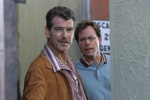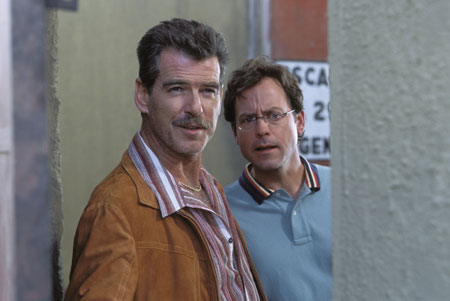The Matador
 Julian Noble (Pierce Brosnan) finds himself in bed with a woman, and what’s the first thing that comes to his mind? He paints his toenails with her nail polish. As he leaves, he emerges streetside and a kid asks, “Hey mister, is that your car?” Seconds later, the Porsche explodes. The gruff toenail-painter with the porn-stache must be an assassin. And then you…
Julian Noble (Pierce Brosnan) finds himself in bed with a woman, and what’s the first thing that comes to his mind? He paints his toenails with her nail polish. As he leaves, he emerges streetside and a kid asks, “Hey mister, is that your car?” Seconds later, the Porsche explodes. The gruff toenail-painter with the porn-stache must be an assassin. And then you…

The Weinstein Company’s production, THE MATADOR.
Julian Noble (Pierce Brosnan) finds himself in bed with a woman, and what’s the first thing that comes to his mind? He paints his toenails with her nail polish. As he leaves, he emerges streetside and a kid asks, “Hey mister, is that your car?” Seconds later, the Porsche explodes. The gruff toenail-painter with the porn-stache must be an assassin. And then you think, “Well, okay… that’s different.”
Greg Kinnear plays Danny Wright, a relatively unsuccessful sales rep. He has to leave on a business trip, but assures his wife, Bean (Hope Davis), he’ll be home in two days. While thunder and lightning crashes outside, he asks Bean, “Still horny?” Just a quick one, and then he’s off to Mexico City.
Danny was laid off by his previous employer of nine years. He and his wife lost their son three years ago in a school bus accident — the only passenger who died. Julian lost his wife. So they have a few things in common, loss and need for some change in their routine. Julian loves bull fights, and invites Danny to one. “A great matador can kill that bull with one plunge of the blade,” says Julian. Danny responds, “There’s no honor in being killed by a man with a blade whether it’s one plunge or twenty.”
“Sometimes people need to be eliminated,” retorts Julian. Danny catches on, but still doesn’t quite believe Julian could be an assassin. I don’t think it’s so much that he doesn’t think it possible that Julian could be one. I think Danny doesn’t conceive of it being probable that he, in his mundane existence, would ever encounter a character so intriguing. With that, Julian shares his “Gotta Pee Theory of Assassinations” — that is, everyone has to go to the bathroom sometime. They track a man to the bathroom, and as Julian explains his “theory” methodically each step of the way, Danny is increasingly convinced that Julian has done this before.
Julian eventually gets Danny to help him. He’ll pay him $50,000, and all Danny has to do is trip at the right time to cause a distraction. Danny gets caught up in the moment, not because he’s a bad person, and not necessarily because he’s a good person driven to do bad things. I almost feel like he’s doing it simply because, irrespective of the morality of killing, Danny wants to feel like he’s involved in something significant and meaningful.
After botching up a job in Manila, Julian has a total breakdown and only sees himself through the crosshairs. Now his employer wants him dead. He disappears and resurfaces a year later at Danny’s residence in Denver. This is where “The Matador” significantly diverges from the typical “unwitting accomplice” movies in which a bad guy somehow reels a good guy into his schemes, largely against his will.
Julian shows up at Danny’s house. Bean doesn’t respond with the usual bewilderment of movie wives in similar situations. Her intrigue isn’t overstated, either. Hope Davis plays it with a cool curiosity—not cartoonish fervor. When Julian observes, “There’s a fucking killer standing in our living room,” Bean’s only response is, “Do you think he would show us his gun?”
The funny part isn’t that she asks, it’s that she intimately knows her guns. Straight setup-and-punchline humor only goes so far. It’s the tangential afterthought that follows which adds bite to wit.
The relationship between Danny and Julian is genuinely believable, bizarre as it may seem. The reason it works is the handling of the characters by Brosnan and Kinnear. Kinnear has an… innocent naivété that isn’t entirely ignorant, but is a bit less than informed. Brosnan doesn’t take the assassin bit too seriously . Rather than revolving all the dialogue around the characters actions, they carry real conversations about off-topic things—kids, marriage, bull-fighting. We like Danny and Julian, as individuals and as a team. We feel both of their mid-life crises because they’re genuinely likeable characters in the same fashion as Steve Carell’s awkward and innocent Andy in “The 40-Year-Old Virgin.”
Will they emerge from their crises with renewed confidence? Probably, but the movie does a good job of keeping us engaged in the characters and the moment. As I tended to notice while thinking of how to approach my review of “Glory Road,” there’s a cultural obsession with outcomes. In this film, the outcome, while definite and not ambiguous, is not without preamble. By the time we reach it, we feel like we’ve seen a complete movie, rather than having sat around for an hour and a half waiting for the ending. That makes the end all the more gratifying, and not simply a tacked-on resolution to which our entire impression remains affixed.
Is it a great film? No. I’ve seen very few great films in the past year, several average films and too many mediocre ones. “The Matador” is less than great, but better than average. That might not be good enough for a hired hit man, but it’s sufficient enough for anyone looking to be entertained without having their intelligence insulted.
 The Matador • Dolby® Digital surround sound in select theatres • Aspect Ratio: 2.35:1 • Running Time: 96 minutes • MPAA Rating: R for strong sexual content and language. • Distributed by The Weinstein Company
The Matador • Dolby® Digital surround sound in select theatres • Aspect Ratio: 2.35:1 • Running Time: 96 minutes • MPAA Rating: R for strong sexual content and language. • Distributed by The Weinstein Company